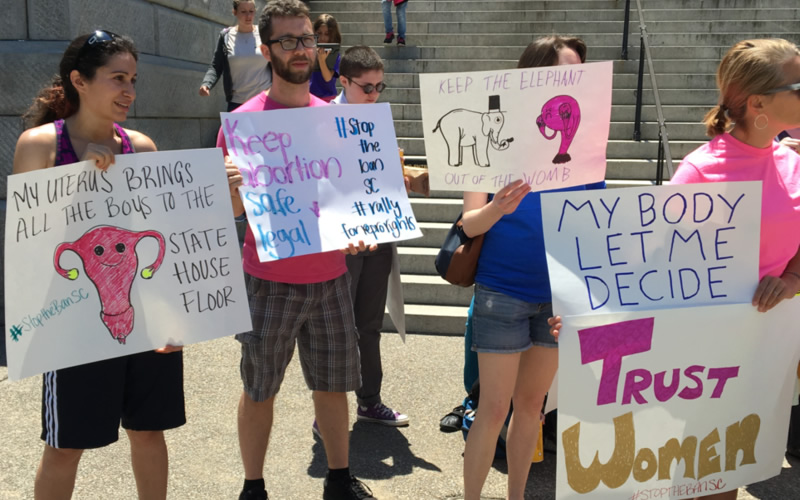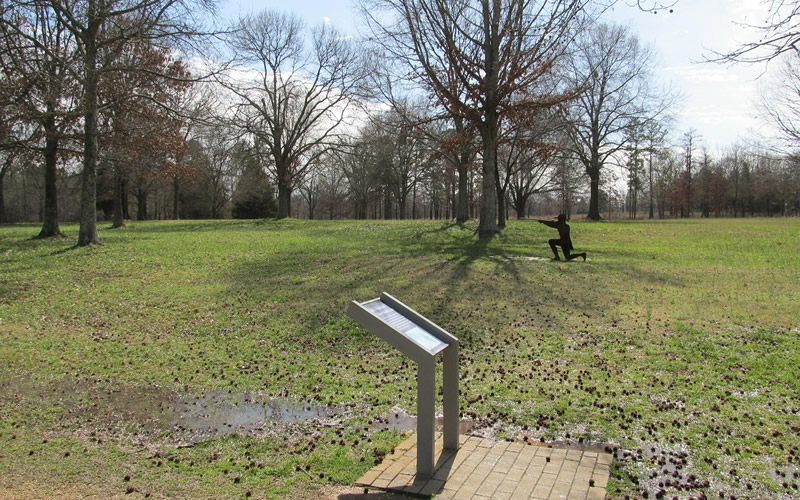NEWS: Senate, House differ little on state budget
BRIEFS: House wades into abortion politics; Crossover looms; Education; more
COMMENTARY, Brack: Slow down on zeal to dump Santee Cooper
NOW AVAILABLE: Brack’s new book highlights how S.C. can do better
SPOTLIGHT: Riley Institute at Furman University
MY TURN, Warner: Abortion ban bill is slap in face to S.C. women
FEEDBACK: On guns, abortion and Santee Cooper
MYSTERY PHOTO: More than a farm field
S.C. ENCYCLOPEDIA: Santee Cooper
BIG STORY: Senate, House differ little on state budget

By Lindsay Street, Statehouse correspondent | When the Senate goes to debate the state budget at mid-month, the $9.3 billion document will not be much different from the one passed by the House, according to staff.
The Senate Finance Committee wrapped up budget deliberations Thursday. Its version of the budget will be printed next week prior to the floor debate, which is expected to begin April 15.
The biggest differences between the Senate and earlier-passed House version of the budget appear to be the Senate’s $11 million increase to base-student cost for K-12 education, a smaller pay raise for judges (from 33 percent proposed in the House down to 15 percent), a one-time $600 bonus for state employees making less than $70,000 per year, and a change in how the state would issue rebates from an unexpected lottery windfall. (The Senate calls for $50 per tax return, instead of the House’s version of $50 per taxpayer.)
The Senate budget also reverses a House proviso that sought to close Denmark Technical College and reopen it as a regional career center.

“I am pretty pleased with the budget that came out of the Senate Finance Committee. We accomplished what I hoped we would accomplish, which is to do right in terms of teacher pay raise and a pay raise for state employees with a one-time bonus,” S.C. Sen. Darrell Jackson, D-Columbia, said Friday. “It went pretty smoothly this year.”
The Senate’s version mirrors the House on a 4-percent teacher pay raise, a 2-percent state employee pay raise, funding for state agencies (including not providing additional funds for S.C. Department of Social Services to meet a federal court order), a proviso capping tuition costs for in-state college students, and $112 million toward deferred maintenance on public college buildings.
Freshman House budget-writing chair Murrell Smith, R-Sumter, is earning praise from members in both chambers and both sides of the aisle for working with the Senate and governor’s office during the House budget-writing process.
“(Ways and Means) Chairman Murrell Smith was coordinating every step of the way with the Senate and the Governor’s Office in how to craft the best budget possible,” House Minority Leader Todd Rutherford said. The Richland Democrat serves on the Ways and Means committee. “The credit goes to the chairman.”
S.C. Sen. Sean Bennett, R-Dorchester, said the budget is “closer than we have been in the last few years.” A member of the Senate Finance Committee, Bennett served on the budget conference committee last year that hashed out differences between the House and Senate versions.
Smith could not be reached for comment prior to deadline.
Floor debate looms
But work remains in the Senate.
Jackson said the biggest debate on the floor will likely surround a proviso that authorizes bid evaluations for state-owned utility Santee Cooper through the state Department of Administration (see Andy Brack’s commentary and News Briefs for more information). Any sale would still need the General Assembly’s approval.

Another contentious point may be teacher pay raises. S.C. Sen. Greg Hembree, R-Horry, voted against the bill leaving the Finance Committee and said he is prepared to vote against it on the floor of the Senate. The reason? The bill mirrors the House on a 4-percent teacher raise.
Hembree said further raising the teacher pay would cost an additional $7.4 million and he plans to bring an amendment to the floor during debate.
“That’s my hill that I’m going to die on,” Hembree said. He said his vote Thursday was the first time he’s voted against a budget in committee. He said he will not vote for any appropriations bill that does not increase teacher pay by at least 5 percent.
Hembree chairs the Senate Education Committee, which has been steeped in education reform efforts since January. He said raising teacher pay won’t reform South Carolina public education overnight, but it would help retain and recruit more teachers, which has been identified as an issue in the profession.

Bennett also worried about teacher pay.
“We have the ability to provide a better salary increase and I don’t think we did it as efficiently as we could have in the budget,” he said.
Bennett called the state employee bonuses and taxpayer rebates “politically good.”
“I’m not sure if it’s the most efficient use of money but I would rather it go back to the taxpayer than be squandered,” he said.
Bennett and Hembree also said a proposed formula to cap college tuition also was in the Senate budget, but there were parts of it that might be controversial and would face floor scrutiny.
- Have a comment? Send to: feedback@statehousereport.com
NEWS BRIEFS
House wades into abortion politics; Crossover looms; Education; more

By Lindsay Street, Statehouse correspondent | In the waning weeks of the legislative session, the House — which has already passed its versions of the state budget and education reform — has waded into abortion politics.
There are no parliamentary maneuvers in the House, such as a filibuster or delaying the vote, that will prevent a vote, according to House Minority Leader Todd Rutherford, D-Richland.
“It is definitely on the path to destroy the woman’s right to choose in the House,” he told Statehouse Report.
This week, the House Judiciary Committee gave a 15-7 favorable report to H. 3020, which would outlaw abortions except in a few instances for fetuses where a heartbeat can be detected. Fetal heartbeats can be detected in four to six weeks following conception, according to medical websites. House Republican leaders Speaker Jay Lucas, Majority Leader Gary Simrill and Speaker Pro Tempore Tommy Pope are cosponsors of the bill. None of the three could be reached for comment.
Georgia’s Gov. Brian Kemp is expected to sign a similar bill there, and S.C. Gov. Henry McMaster has already expressed support for a similar bill.
According to a state Revenue and Fiscal Affairs Office report, the bill would permit the state’s attorney general to bring a civil action under certain circumstances and would create a new civil cause of action for certain women who have an abortion. There is no anticipated fiscal impact on the state’s general fund or state agencies.
The bill joins a slew of bills seeking second reading in the House, and is currently on the uncontested calendar for the House (likely to change by Tuesday’s session).
“Any hope in stopping or pausing the bill is in the Senate,” Rutherford said.
It’s a familiar battle for Senate Democrat, who are fresh from a 2018 abortion fight, where Orangeburg Sen. Brad Hutto offered a poison-pill amendment and Charleston Sen. Marlon Kimpson filibustered to bill. The Senate is still in the throes of writing its version of the budget and redrafting the massive education overhaul bill. Senate Education Chair Greg Hembree, R-Horry, said the fetal heartbeat bill may struggle to make a floor vote prior to recess.
“It would take an exceptional commitment to get that bill to the Senate floor before the end of the year,” he said. But, he added, if it did, it could impede the education reform package. “Absolutely it has potential to impact education reform. You could end the session on that topic and you will have missed an opportunity to do something big and meaningful.”
In other news:
![]() Crossover is April 11. After April 11, a supermajority is needed to take up bills approved by the other chamber. It’s the date that proclaims contentious bills to be essentially dead if they haven’t passed one chamber by then — though this year it is more symbolic since this is only the first of a two-year session. Bills that haven’t received a vote by end of session will be carried over to January. All the same, a flurry of legislative activity is expected Tuesday and Wednesday.
Crossover is April 11. After April 11, a supermajority is needed to take up bills approved by the other chamber. It’s the date that proclaims contentious bills to be essentially dead if they haven’t passed one chamber by then — though this year it is more symbolic since this is only the first of a two-year session. Bills that haven’t received a vote by end of session will be carried over to January. All the same, a flurry of legislative activity is expected Tuesday and Wednesday.
Santee Cooper sale passes House. H. 4287 that authorizes a nine-member legislative committee to evaluate bids for the purchase, partial purchase or management of state-owned utility Santee Cooper has passed the House. The measure now goes to the Senate, which was weighing its own resolution that would direct the evaluation of bids through the Department of Administration. The Senate Finance Committee added the measure as a proviso into its version of the state appropriations bill. (See Andy Brack’s commentary this week to learn more.) While visiting Summerville on Wednesday, Gov. Henry McMaster was asked about his stance on Santee Cooper. According to a tweet from The Post and Courier Caitlin Byrd, McMaster responded: “I think the sale of Santee Cooper is inevitable.”
House OKs renaming Charleston airport. The House has passed a resolution that would rename the Charleston International Airport in honor of former Democratic governor and U.S. Sen. Fritz Hollings. Hollings served as governor from 1959 to 1963, and as a U.S. senator from 1966 to 2005. If the Senate passes the resolution and it is signed into law by Gov. Henry McMaster, the Charleston airport would be named the “Ernest F. ‘Fritz’ Hollings Charleston International Airport.” S.C. Rep. Leon Stavrinakis, D-Charleston, introduced the bill and said Hollings deserves the honor for his “significant” contribution to transportation in the state. But S.C. Sen. Paul Campbell, R-Goose Creek, who serves as CEO of the airport authority, has already voiced opposition to the resolution.
Weekly update on Palmetto Priorities
 Throughout the legislative session, we’ll provide you relevant updates related to our list of Palmetto Priorities, which are 10 big policy areas where major progress is needed for South Carolina to escape the bottom of lots of lists. Over the last week:
Throughout the legislative session, we’ll provide you relevant updates related to our list of Palmetto Priorities, which are 10 big policy areas where major progress is needed for South Carolina to escape the bottom of lots of lists. Over the last week:
EDUCATION, PART 1: Education chair says education reform not ‘stalled.’ A recent article in The Post and Courier called education reform in the Senate “stalled,” but Senate Education Chairman Greg Hembree disagreed. He said he’s “confident” he will get it out of subcommittee after next week’s review of the sixth and final component of the bill. He said he’s “hopeful” to get it out of full committee to the floor, but said there is the potential for it be hung up in full committee by a few members. “I’m just concerned we lose momentum,” Hembree told Statehouse Report. Last week, Lucas, who championed the education reform package in the House, worried about the Senate weakening the House’s version. Read more here.
EDUCATION, PART II: School consolidation bill advances. S. 203 paves a path for more school district consolidation. The bill needs a third and final vote in the Senate before heading to the House. Hembree said Friday that the bill is one to watch for next week.
EDUCATION/JOBS: Education-to-work database hub advances. A proposed data hub that looks at student’s outcomes in the workforce is heading to the House floor after gaining a favorable report from the body’s Education and Public Works committee this week. H. 3757 would create a committee that would create and manage the data hub.
EDUCATION/JOBS/HEALTH CARE: Grants for internet program approved by House. H. 3780 has passed the House and now heads to the Senate. The bill aims to provide state grants to internet providers bringing service to underserved areas of the state. The bill’s sponsor, S.C. Rep. Brian White, R-Anderson, previously billed it as a way to support education in state. Recent coverage this week focused on the bill’s support of telehealth initiatives. Read more.
CORRECTIONS: Sentencing reform on floor in House. The sentencing reform bill, H. 3322, received a favorable report more than a week ago, and is expected to be debated next week. According to a Jan. 8 summary of the bill, the bill amends a significant number of criminal law statutes related to supervision of offenders, restitution, revocations, and parole proceedings; minimum sentences and penalty provisions; and drug courts.
Early state presidential news tool available
 Want to know more about what’s happening in the 2020 presidential primary process in South Carolina?
Want to know more about what’s happening in the 2020 presidential primary process in South Carolina?
You can keep up with the latest in 2020 presidential election news a by signing up for our new free daily news roundup. Subscribe.
Looking ahead
Click below for other items coming up in the Statehouse:
- House calendar
- Senate calendar
- Have a comment? Send to: feedback@statehousereport.com
Find any bill
BRACK: Slow down on zeal to dump Santee Cooper

By Andy Brack, Statehouse Report | One of the first lessons taught to students of business is to buy low and sell high. But that lesson seems to go out the window whenever state legislators start talking about Santee Cooper, the state-owned utility with a $4 billion debt thanks to a failed investment with SCE&G to build nuclear reactors in Fairfield County.
 State lawmakers, some grumbling Santee Cooper is an economic dinosaur with a bleak future, appear to be rushing pell-mell toward selling the utility at a bargain-basement price as private companies dump money into advertising, lobbying and who knows what else to acquire its assets.
State lawmakers, some grumbling Santee Cooper is an economic dinosaur with a bleak future, appear to be rushing pell-mell toward selling the utility at a bargain-basement price as private companies dump money into advertising, lobbying and who knows what else to acquire its assets.
For generations, Santee Cooper has been a pet protected by legislators, who got great perks like hunting trips, from the utility. Now it is facing political wrath after the nuclear debacle from legislators who may not have benefited as much as past colleagues.
It’s a Statehouse drama that blends the worst of politics, the utility’s institutional arrogance, bad corporate decision-making, the search for a scapegoat, misinformation and too many myths to digest in one sitting. Example: Many people think all S.C. taxpayers will have to foot Santee Cooper’s debt if it remains as it is. Not true, according to state law, which specifically limits debts to ratepayers to pay off bonds.
James Y. Kerr, chief legal officer of the Southern Company, told members of the S.C. Senate Judiciary Committee on April 2 that issues related to Santee Cooper were extremely complex and difficult to settle in a political environment. Southern, a regional power company, is a private utility that has expressed an interest in managing, not buying, Santee Cooper.
 Selling the utility would cause rates to go up, Kerr testified, referring to a 40-page February report by ICF on outside interest and offers for Santee Cooper.
Selling the utility would cause rates to go up, Kerr testified, referring to a 40-page February report by ICF on outside interest and offers for Santee Cooper.
“It makes clear on its face that if you were to privatize Santee Cooper or sell it to a company like ours, an investor-owned utility, rates will go up, by roughly $280 million or 15 percent higher than the business-as-usual case,” Kerr said. He added that keeping Santee Cooper as an asset and having it managed and run better was an option that had benefits, such as allowing the state to keep a valuable asset.
“What the ICF report makes clear is really the net benefit to the customers of Santee Cooper in terms of keeping rates lower really are to be found in running it different — running it more operationally efficient, and that is both just the business itself, the non-fuel operations and maintenance costs of the business, but also with some interconnected utility such as Southern, possibly SCANA, possibly Duke. There’s an opportunity to, by contract, not sell the company, but frankly dispatch Santee’s system as part of a much bigger system.”
The state’s electric cooperatives, which buy a majority of the power generated by Santee Cooper, have filed a lawsuit to protect its ratepayers, as outlined in a February article for members: “The status quo at Santee Cooper is unacceptable, and co-op members deserve the best price that can be obtained for power, whether that’s through a transformed Santee Cooper or another party purchasing part or all of it.”
Santee Cooper says its rates are now competitive nationally, regionally and statewide, offering the lowest rates in the state. It says rates won’t go up much in the future — and will go up less than privately-owned utilities already here. And it says it can manage its nuclear debt.
The General Assembly needs to go into timeout and slow down on Santee Cooper. Is selling Santee Cooper the best business decision for the state at this point? Is selling the utility a smart use of state assets over time when they may become more valuable?
“I want more facts so the best decision can be made,” one state senator told us. “It is too early to vote without full facts.”
At some point, it may be in South Carolina’s best interest to divest itself of Santee Cooper. But for now, there are too many questions to rush into a sale. Lawmakers need to take their time and debate without the shrill emotion that’s on display anytime the subject comes up.
- Have a comment? Send to: feedback@statehousereport.com.
Brack’s new book highlights how S.C. can do better
 Statehouse Report editor and publisher Andy Brack has a new book of selected columns since 2014 that delve into how South Carolina can do better to help people through politics and the governing process.
Statehouse Report editor and publisher Andy Brack has a new book of selected columns since 2014 that delve into how South Carolina can do better to help people through politics and the governing process.
We Can Do Better, South Carolina! offers incisive commentaries on the American South, the common good and interesting South Carolina leaders, such as former U.S. Sen. Fritz Hollings, civil rights advocate Septima Clark, former S.C. Gov. David Beasley and more. There also are discussions on civil rights struggles with which the Palmetto State continues to grapple. as well as commentaries on politics, governments, the hangovers of South Carolina’s past and her future opportunities.
The 227-page book ends with a discussion of Palmetto Priorities — columns related to Statehouse Report’s continuing push for state lawmakers to adopt a broad agenda for reform throughout government. Included are discussions on education, tax reform, environmental justice and more.
We Can Do Better, South Carolina! is available exclusively as a Kindle book for $7.99. Click here to purchase a Kindle copy. A paperback version will be ready for order in the next week.
- If you have a comment or questions about the book, please let us know at: feedback@statehousereport.com.
SPOTLIGHT: Riley Institute at Furman University
 The public spiritedness of our underwriters allows us to bring Statehouse Report to you at no cost. This week’s spotlighted underwriter is The Richard W. Riley Institute of Government, Politics, and Public Leadership, a multi-faceted, non-partisan institute affiliated with the Department of Political Science at Furman University. Named for former Governor of South Carolina and United States Secretary of Education, Richard Riley, the Institute is unique in the United States in the emphasis it places on engaging students in the various arenas of politics, public policy, and public leadership.
The public spiritedness of our underwriters allows us to bring Statehouse Report to you at no cost. This week’s spotlighted underwriter is The Richard W. Riley Institute of Government, Politics, and Public Leadership, a multi-faceted, non-partisan institute affiliated with the Department of Political Science at Furman University. Named for former Governor of South Carolina and United States Secretary of Education, Richard Riley, the Institute is unique in the United States in the emphasis it places on engaging students in the various arenas of politics, public policy, and public leadership.
- Learn more about the Riley Institute.
- Also learn more about the Riley Institute’s Center for Education Policy and Leadership.
Warner: Abortion ban bill is slap in face to S.C. women

By Ann Warner, Special to Statehouse Report | By now you’ve read the news: an extreme and dangerous abortion ban passed through the House Judiciary Committee by a vote of 15-7 after six hours of discussion about how outrageously harmful this bill would be for women, their families, doctors, tax payers, and the rule of law.

And to add insult to injury, it all happened on Equal Pay Day – a day that shines a light on the persistent gender wage gap in our state.
Every day the women of South Carolina must deal with the fact that we are among the worst states in the nation when it comes to violence against women, economic equality, maternal and infant mortality, and women’s leadership.
It is a slap in the face when our elected officials choose to spend our state’s resources undermining our healthcare access and undercutting our ability to make decisions that will affect us more than anyone: decisions about pregnancy and parenting.
With moves like this, we can anticipate South Carolina’s ranking as the 45th most inequitable state for women to plummet even further.
To recap, H.3020 would prevent most women from getting abortions as early as six weeks into a pregnancy, before most people even know that they are pregnant. This is an egregious invasion of privacy. Women are fully capable of making decisions about pregnancy and parenting. Their rights to do so have been upheld by decades of legal precedent. What makes South Carolina legislators think they know better than women?
The impact of passing H.3020 cannot be overstated. If this bill passes, we know what will happen:
- Doctors have testified that the provision of health care during pregnancy would be severely compromised by this bill, and in fact, many OB/GYNs would stop practicing altogether in South Carolina. In a state where 17 counties do not have a single OB/GYN, we cannot afford to put up any more barriers to quality care.
- Extensive research has shown that women denied abortions are more likely to experience serious complications from the end of pregnancy, including eclampsia and death. They are more likely to remain with abusive partners. They are more likely to suffer anxiety and loss of self-esteem in the short term after being denied abortion.
- Women denied abortions suffer economic consequences: According to peer-reviewed studies, women refused an abortion have four times greater odds of living below the Federal Poverty Level.
- Any woman of reproductive age would be affected by this law, but the worst effects would be on people who have less access to health care, including young women, women of color, women with disabilities, women with low incomes, and women living in rural areas.
While some lawmakers see women’s health as a political game to be strategically leveraged to test the courts systems, we all need to remember that real women’s health, dignity, and freedom hang in the balance.
South Carolinians do NOT want such an extreme bill. According to a recent Winthrop poll, a significant majority of South Carolinians recognize certain circumstances when legal abortion may be appropriate.
We can stop this bill if we speak up. Call your representative today: ask for their leadership and tell them “NO” on H.3020.
Ann Warner is CEO of WREN, the South Carolina Women Rights and Empowerment Network.
- Have a comment? Send to: feedback@statehousereport.com..
FEEDBACK
On guns, abortion and Santee Cooper
![]() To the editor:
To the editor:
Thank you for your article on the poll regarding guns and abortion. I am a registered Republican, though I am now ashamed to say that. I am passionately pro-choice. Could someone please ask these Republicans who are so outspoken about limiting government why they feel they should insert themselves into a doctor/patient relationship? ( I am a doctor). I also support gun legislation and am a gun owner.
— Rebecca, Daniel Island, S.C.
Santee Cooper sale is short-sighted
To the editor:
As a property owner on Lake Marion with a marginal lease bordering the lake, I’m concerned about the sale of Santee Cooper and potential changes to marginal leases as well as the management of the lakes. There has been no reporting on these issues which will have great financial impact on property owners and the economy of communities bordering the lakes.
— Beverly Moberg, Summerton, S.C.
Send us your thoughts … or rants
We love hearing from our readers and encourage you to share your opinions. But you’ve got to provide us with contact information so we can verify your letters. Letters to the editor are published weekly. We reserve the right to edit for length and clarity. Comments are limited to 250 words or less. Please include your name and contact information.
- Send your letters or comments to: feedback@statehousereport.com
MYSTERY PHOTO: More than a farm field

This might look like any old field. But it’s not. Three-part question: What is it, where is it and why is it important? Send your guess about the location of this photo to feedback@statehousereport.com. And don’t forget to include your name and the town in which you live.
Our previous Mystery Photo
 Our March 29 mystery, “Interesting old building” seemed to be not much of a mystery for people in the Upstate, particularly Lancaster, which is hope to the Lancaster and Chester Railway Building on South Main Street.
Our March 29 mystery, “Interesting old building” seemed to be not much of a mystery for people in the Upstate, particularly Lancaster, which is hope to the Lancaster and Chester Railway Building on South Main Street.
Congratulations to these sleuths: Charles Davis of Aiken, Steve Willis of Lancaster; Lewis Spearman; Don Gordon of Mount Pleasant; George Graf of Palmyra, Va..; Dale Rhodes of Richmond, Va.; Jay Altman of Columbia; Don Clark and Bill Segars, both of Hartsville; Henry Eldridge of Tega Cay; Philip Cromer of Beaufort; and Faith Line of Anderson.
Graf shared this: “The Lancaster & Chester Railroad Museum was created to give a photographic history of the L&C since its inception in 1896 and also of all other railroads in South Carolina. The museum has over 600 mounted photographs and display cases of railroad memorabilia. In addition, the museum has a large operating HO scale layout of the L&C.”
Willis asked us whether we’d share this: “Are you going to mention that when the Colonel opened it he had Gypsy Rose Lee present as he had named her the Railroad Vice President in charge of unveiling? He was quite a character.”
Part of an old cotton seed house can be seen in the left of the photo, writes Clark.
- Send us a mystery: If you have a photo that you believe will stump readers, send it along (but make sure to tell us what it is because it may stump us too!) Send to: feedback@statehousereport.com and mark it as a photo submission. Thanks.
S.C. ENCYCLOPEDIA
HISTORY: Santee Cooper

S.C. Encyclopedia | The history of the Santee Cooper project can be traced to 1785, when a group of wealthy investors petitioned the General Assembly to construct a canal connecting the Santee and Cooper Rivers in order to improve inland navigation between Charleston and Columbia. The twenty-two-mile canal opened in 1800 and for the next fifty years allowed planters to ship cotton, rice, and timber to Charleston. By the mid–nineteenth century, however, railroads virtually eliminated the need for the inland waterway, and swampy vines reclaimed the canal. During the 1920s Thomas C. Williams, an engineer and steamboat operator, gained rights to rebuild the canal and reopen the area to inland navigation. Williams’s Columbia Railroad and Navigation Company retained the rights to this project for eight years, but financial concerns frustrated construction efforts.
In 1934 Governor Ibra Blackwood signed a bill creating the South Carolina Public Service Authority and granting it permission to dam the Santee River, divert its water into the Cooper River, clear land for two large reservoirs, construct a hydroelectric plant at Pinopolis, and sell electricity to residents in surrounding counties. A year later President Franklin Delano Roosevelt gave the Public Service Authority approval to draw on funding from the Public Works Administration, making the Santee Cooper project (as it was quickly dubbed) the largest New Deal program in the Palmetto State.
Santee Cooper had several purposes. The project would provide economic relief to the area by drawing the majority of its workforce from relief rolls; the hydroelectric plant would contribute to the electrification of rural farms; the creation of two reservoirs would reopen navigation from Charleston to Columbia; and the regulation of the Santee River would prevent future flooding and eliminate malarial outbreaks. This combination of cheap power, efficient transportation, and a healthy environment would attract industry to the impoverished agricultural region of the state. Santee Cooper received support from the prominent U.S. senator James F. Byrnes, who was largely responsible for persuading President Roosevelt to support the project, and Charleston mayor Burnet Maybank, who spearheaded the campaign for public and political support within the state.
Construction, however, was not a foregone conclusion. The Santee Cooper project met opposition from several groups. In Washington, Secretary of the Interior Harold Ickes, for personal and political motives, opposed federal funding of the project. In South Carolina, private utility companies denounced what they saw as a government monopoly on production and sale of power. In the Santee Cooper area, private landowners fought the dislocation of families living in the new flood basins and the inundation of historic homes, churches, and battlefields. In addition, environmentalists voiced disapproval over the destruction of wildlife habitat in the Santee Swamp and the elimination of thousands of acres of virgin hardwood forest.
Following a four-year court battle, construction began in 1939. At its peak, the project employed nearly fifteen thousand workers, most of whom came from Depression relief rolls. Living in military-style camps scattered throughout the Santee and Pinopolis basins, the laborers cleared more than 160,000 acres with handsaws and mule-drawn wagons. They hauled dirt and clay to dam sites, built railroads, relocated cemeteries, and aided in the construction of the diversion and tail-race canals and the new power plant. Sightseers from across the state came by the thousands to witness the massive undertaking that became the largest land-clearing project in United States history and created the largest single-lift lock in the world.
In 1941 President Roosevelt declared the Santee Cooper a defense project, and one year later the power plant in Pinopolis began generating power. Within two decades it was providing electricity to the majority of the state’s farms as well as industries in surrounding counties. More surprisingly, the new reservoirs, renamed Lake Marion and Lake Moultrie, attracted sport fishermen from across the country. Soon vacation homes, state parks, and fish camps dotted the 450-mile perimeter of the lakes. By the end of the twentieth century fishing, boating, and other recreational activities brought more than $200 million in annual revenue to Santee Cooper country.
By the end of the twentieth century, the Public Service Authority sold wholesale electricity to twenty cooperatives and two municipalities that served approximately 600,000 customers, and it directly retailed electricity to more than 130,000 additional in-state customers. One of the largest state-owned utilities in the nation, Santee Cooper operates in all forty-six counties in South Carolina. In the 1990s the Public Service Authority expanded its operations and created the Santee Cooper Regional Water System to treat and transport water from Lake Moultrie and provide water for much of the South Carolina Lowcountry.
— Excerpted from an entry T. Robert Hart. This entry may not have been updated since 2006. To read more about this or 2,000 other entries about South Carolina, check out The South Carolina Encyclopedia, published in 2006 by USC Press. (Information used by permission.)
ABOUT STATEHOUSE REPORT
Statehouse Report, founded in 2001 as a weekly legislative forecast that informs readers about what is going to happen in South Carolina politics and policy, is provided to you at no charge every Friday.
- Editor and publisher: Andy Brack, 843.670.3996
- Statehouse correspondent: Lindsay Street
More
- Mailing address: Send inquiries by mail to: P.O. Box 22261, Charleston, SC 29407
- Subscriptions are free: Click to subscribe.
- We hope you’ll keep receiving the great news and information from Statehouse Report, but if you need to unsubscribe, go to the bottom of the weekly email issue and follow the instructions.
- © 2019, Statehouse Report. All rights reserved.


